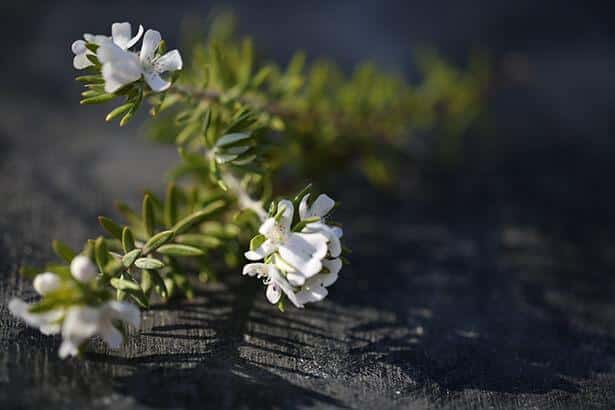Thai Eggplant
And why food and stories belong together
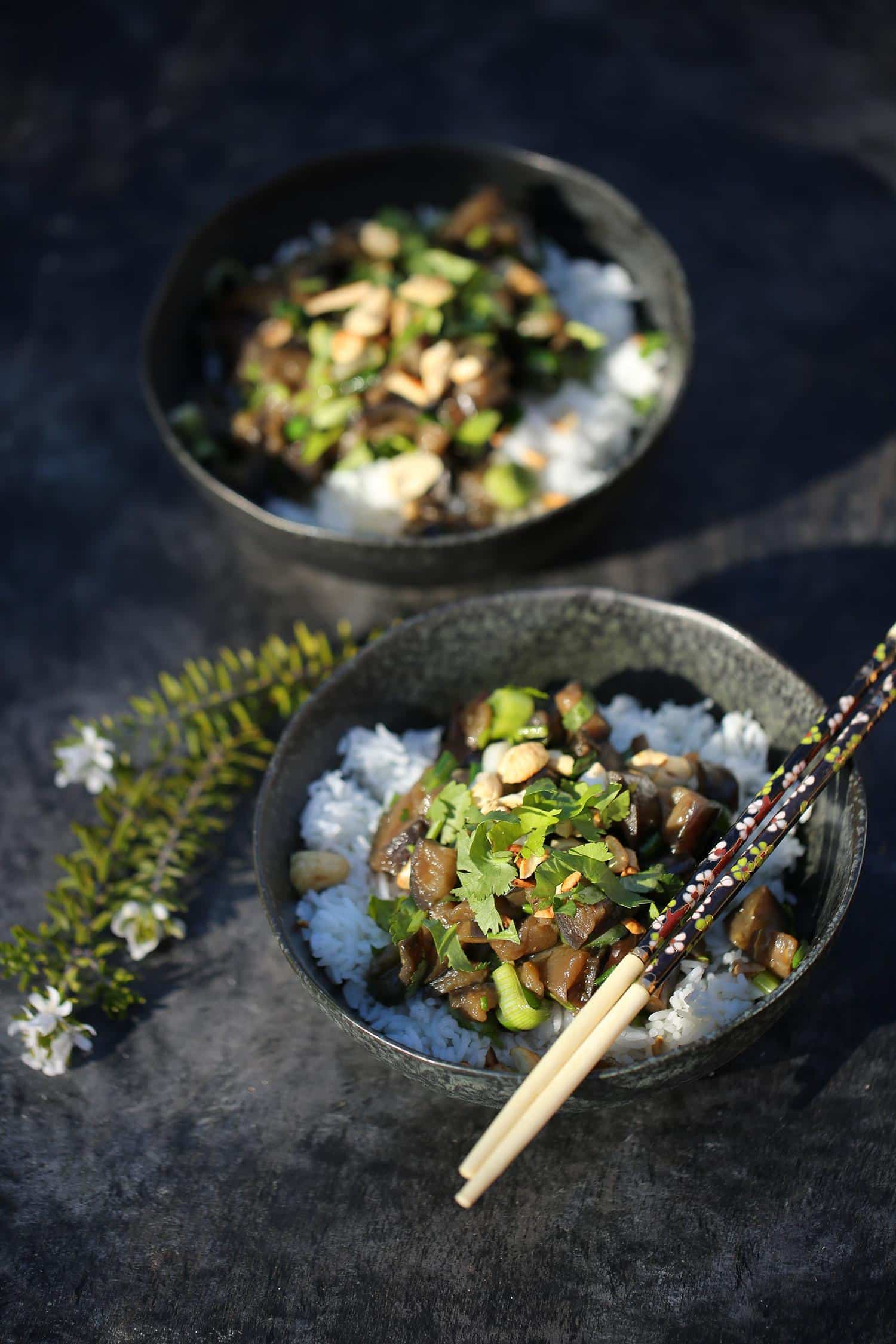
It’s hard to imagine today, but as a child I was “a bad eater”. I grew up in a three generations house and often ate lunch at my grandparents’ apartment. My grandfather, the medicine man, mostly sat silently at the table and made funny faces when I looked over at him. My grandmother cooked. Having experienced the hunger of war, it was difficult for her to watch a member of her family not eating much and “looking so thin”. In her dialect, she often said to me jokingly: “Kind, iss, dass was wirsch, nix bisch scho lang.” (a Southern German saying that means as much as “you are just skin and bones. Eat more to get strong!”). My grandmother had a difficult childhood during which she was abused and kept indoors by her stepmother for many years. And yet she turned out to be one of the warmest and kindest people I have ever met. When her stepmother was ill, my grandmother took the old woman into her home and took care of her until the end. The rest of the family only found out much later about the abuse she suffered during her childhood and youth.
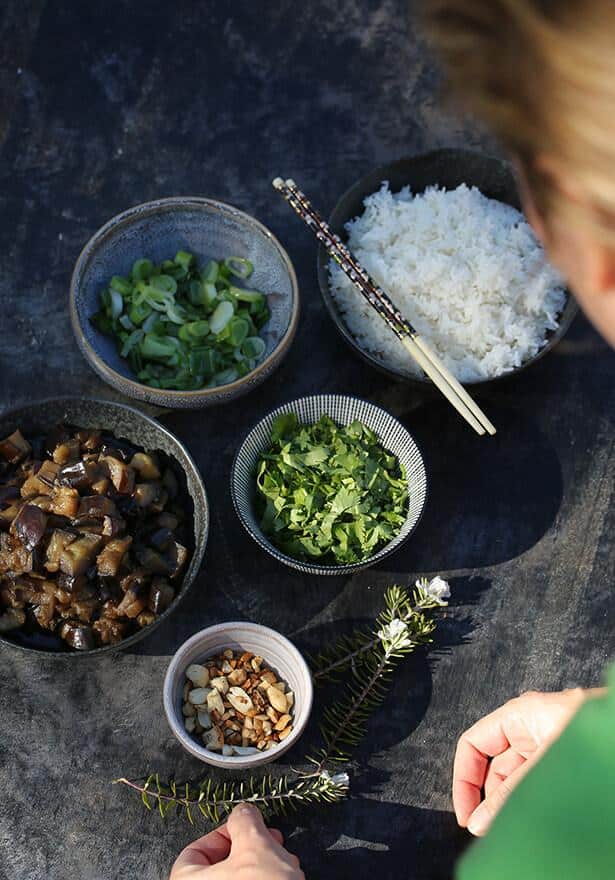
My grandmother felt responsible for the physical well-being of the whole family. My mother was “on a health trip” and she prepared a delicious salad plate for her every lunchtime. My grandfather liked to eat anything that reminded him of his homeland in East Prussia, so she served him poached dried fruit with the pancakes, where the rest of us just got a dollop of jam. And since I was “a bad eater”, I became her special project. Since she knew me well, she knew exactly which buttons she had to push in order to reach her goal. And so she turned to storytelling. While I sat at her kitchen table and picked at my food, she would tell me about princesses, fairies, witches, kings and dwarves. I listened spellbound and pushed one or two more forks into my mouth, which in turn made my grandmother very happy.
Today I suspect that it was my grandmother who laid the foundation for this food blog. Because she made good food and stories inseparable for me. A good story just makes good food that much better. It also makes some things easier to digest. Or it fills you up on a level that food alone can’t do. Where food brings pleasure, it brings stimulation. Where food provides us with nutrients, it provides us with the material that dreams are made of. Good food and good stories create a home for the heart and soul in a world that isn’t always kind and comfortable. Stories and recipes can be used to build entire living spaces that can give us peace, inspiration, strength and new hope. Stories and food – honestly, what more do you need to be happy?
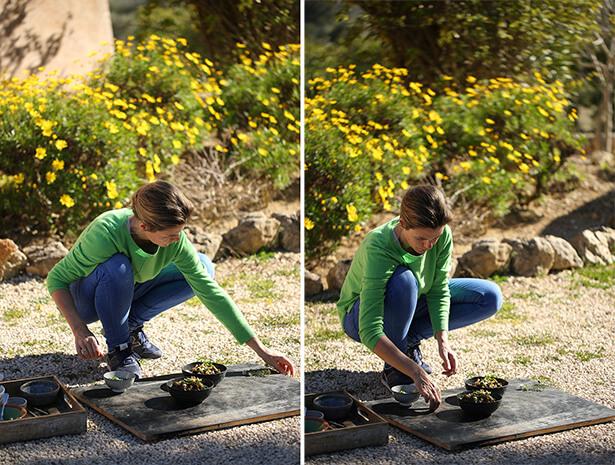
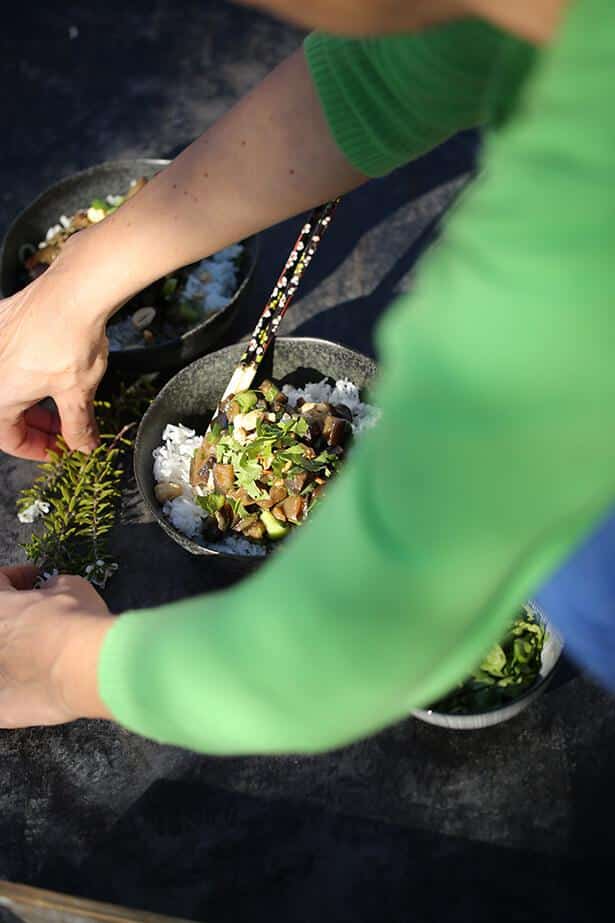
My recipe of the week
A beautiful story has a specific narrative structure; a clear structure, a certain flow, a hero and a direction towards which all the storylines go. A good recipe also requires all these things. It needs a defined aroma, a clear direction and ideally a hero. In this case, that hero is the eggplant. Lately I’ve been cooking a lot at home what I refer to as a “mono-vegetable recipe” to my husband. So I take a single vegetable and cook a whole meal out of it (okay, some rice, quinoa or pasta can play supporting role). Most of the time we are delighted with the result because it is so simple and yet so good. A real product kitchen, where you put the individual vegetables on a stage and really celebrate it. The aubergine tastes particularly good when it is pan-fried with soy sauce and some maple syrup and then cooked in its own liquid. This way it becomes soft and creamy, with a stunning umami taste. I like to add fresh coriander, spring onions, garlic and ginger and add a few crunchy nuts to the bowl to make the texture more exciting. The result is a Thai dish, which, however, is interpreted completely freely and tells its own story while being eaten.
And now my question to you: do you also think that good food and stories simply belong together? What makes the connection so irresistible to you? I’m looking forward to your comment under this post!
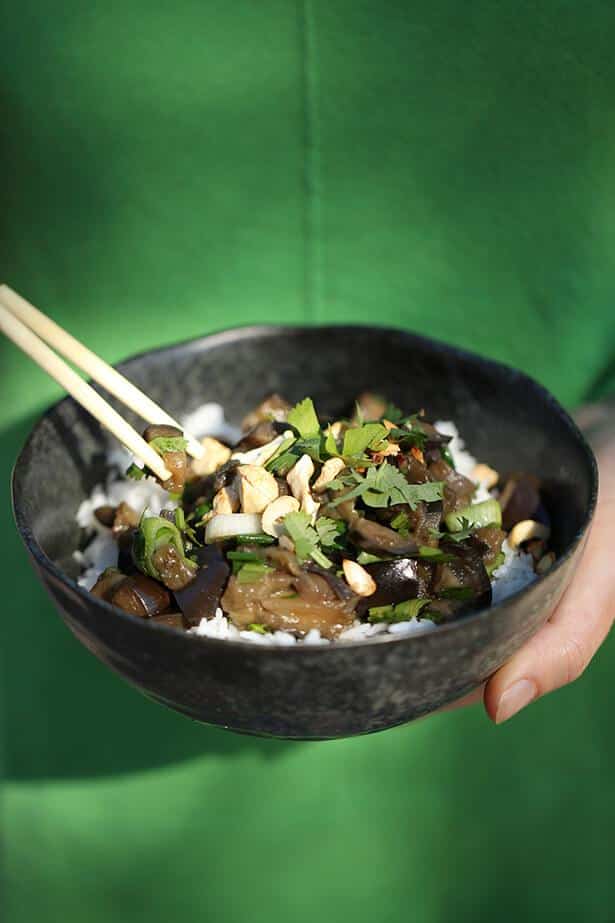


THAI EGGPLANT
Ingredients
For the rice:
- 150 g basmati rice
- 300 ml water
- 1/3 tsp salt
For the Thai eggplant:
- 50 g cashew nuts roughly chopped
- 0.5 tbsp coconut oil
- 2 spring onions cut into rings
- 2 cloves garlic peeled and chopped
- 1 tsp finely grated ginger
- 1 tbsp coconut oil
- 800 g aubergines diced
- 4 tbsp soy sauce
- 1 tbsp maple syrup
- optional: some chili or Tabasco to taste
- 30 g fresh coriander chopped including the stems
Instructions
- Wash the basmati rice in a sieve, place in a saucepan with a suitable lid and add water and salt. Bring the whole thing to a boil with the lid closed. As soon as the water boils, turn the heat to the lowest possible temperature and let the rice steep for about 15 minutes until it is cooked through. If necessary, switch off the stove completely so that nothing burns. Keep the rice warm with the lid on until the eggplants are done.
- Heat a pan and toast the chopped cashews while stirring. Pour into a bowl and set aside.
- In the same pan, heat coconut oil and briefly sauté the spring onions, garlic and ginger while stirring. Pour into a bowl and set aside.
- Using the same pan, heat coconut oil and stir-fry the diced aubergines. Mix in the soy sauce and maple syrup, reduce the heat to medium-low and let simmer, covered, for about 15 to 20 minutes. Check occasionally that the aubergines are not burning. The heat should be such that the aubergines gently steam and cook in their own water. After 15 to 20 minutes they should have a soft, creamy consistency. Now the heat can be increased again briefly to get a light browning.
- If you like, you can add some chili or Tabasco to taste.
- Mix the aubergines in the pan with the spring onion, garlic and ginger mixture and fold in the coriander and some of the cashews. Serve with rice and serve with the remaining cashews.
